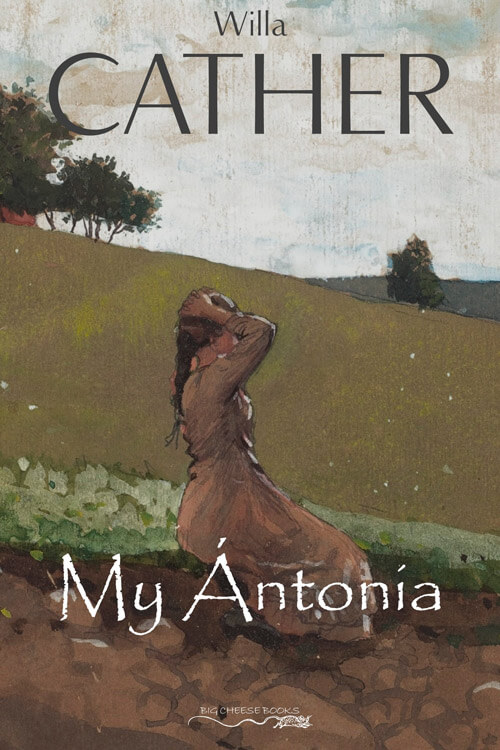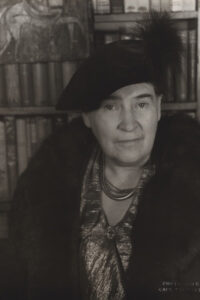
My Ántonia
LAST summer, I happened to be crossing the plains of Iowa in a season of intense heat, and it was my good fortune to have for a travelling companion James Quayle Burden—Jim Burden, as we still call him in the West. He and I are old friends—we grew up together in the same Nebraska town—and we had much to say to each other. While the train flashed through never-ending miles of ripe wheat, by country towns and bright-flowered pastures and oak groves wilting in the sun, we sat in the observation car, where the woodwork was hot to the touch and red dust lay deep over everything. The dust and heat, the burning wind, reminded us of many things. We were talking about what it is like to spend one’s childhood in little towns like these, buried in wheat and corn, under stimulating extremes of climate: burning summers when the world lies green and billowy beneath a brilliant sky when one is fairly stifled in vegetation, in the color and smell of strong weeds and heavy harvests; blustery winters with little snow, when the whole country is stripped bare and gray as sheet-iron. We agreed that no one who had not grown up in a little prairie town could know anything about it. It was a kind of freemasonry, we said.
Although Jim Burden and I both live in New York and are old friends, I do not see much of him there. He is legal counsel for one of the great Western railways and is sometimes away from his New York office for weeks together. That is one reason why we do not often meet. Another is that I do not like his wife.
When Jim was still an obscure young lawyer, struggling to make his way in New York, his career was suddenly advanced by a brilliant marriage. Genevieve Whitney was the only daughter of a distinguished man. Her marriage with young Burden was the subject of sharp comment at the time. It was said she had been brutally jilted by her cousin, Rutland Whitney, and that she married this unknown man from the West out of bravado. She was a restless, headstrong girl, even then, who liked to astonish her friends. Later, when I knew her, she was always doing something unexpected. She gave one of her townhouses for a Suffrage headquarters, produced one of her plays at the Princess Theater, was arrested for picketing during a garment-makers’ strike, etc. I am never able to believe that she has much feeling for the causes to which she lends her…
Read or download Book
Willa Cather
Willa Sibert Cather (December 7, 1873 – April 24, 1947) was an American writer known for her novels of life on the Great Plains, including O Pioneers!, The Song of the Lark, and My Ántonia. In 1923, she was awarded the Pulitzer Prize for One of Ours, a novel set during World War I.
Willa Cather and her family moved from Virginia to Webster County, Nebraska, when she was nine years old. The family later settled in the town of Red Cloud. Shortly after graduating from the University of Nebraska–Lincoln, Cather moved to Pittsburgh for ten years, supporting herself as a magazine editor and high school English teacher. At the age of 33, she moved to New York City, her primary home for the rest of her life, though she also traveled widely and spent considerable time at her summer residence on Grand Manan Island, New Brunswick. She spent the last 39 years of her life with her domestic partner, Edith Lewis, before being diagnosed with breast cancer and dying of a cerebral hemorrhage. Lewis is buried beside her in a Jaffrey, New Hampshire plot.
Cather achieved recognition as a novelist of the frontier and pioneer experience. She wrote of the spirit of those settlers moving into the western states, many of them European immigrants in the nineteenth century. Common themes in her work include nostalgia and exile. A sense of place is an important element in Cather’s fiction: physical landscapes and domestic spaces are for Cather’s dynamic presence against which her characters struggle and find community.
Early life and education
Cather was born in 1873 on her maternal grandmother’s farm in the Back Creek Valley near Winchester, Virginia. Her father was Charles Fectigue Cather. The Cather family originated in Wales, the name deriving from Cadair Idris, a Gwynedd mountain. Her mother was Mary Virginia Boak, a former school teacher. By the time Cather turned twelve months old, the family had moved to Willow Shade, a Greek Revival-style home on 130 acres given to them by her paternal grandparents.
Mary Cather had six more children after Willa: Roscoe, Douglass, Jessica, James, John, and Elsie. Cather was closer to her brothers than to her sisters whom, according to biographer Hermione Lee, she “seems not to have liked very much.”
At the urging of Charles Cather’s parents, the family moved to Nebraska in 1883 when Willa was nine years old. The farmland appealed to Charles’ father, and the family wished to escape the tuberculosis outbreaks that were rampant in Virginia. Willa’s father tried his hand at farming for eighteen months, then moved the family into the town of Red Cloud, where he opened a real estate and insurance business, and the children attended school for the first time. Some of Cather’s earliest work was first published in the Red Cloud Chief, the city’s local paper, and Cather read widely, having made friends with a Jewish couple, the Wieners, who offered her free access to their extensive library in Red Cloud. At the same time, she made house calls with the local physician and decided to become a surgeon. For a short while, she signed her name as William, but this was quickly abandoned for Willa instead.
In 1890, at the age of sixteen, Cather graduated from Red Cloud High School. She moved to Lincoln, Nebraska to enroll at the University of Nebraska–Lincoln. In her first year, her essay on Thomas Carlyle was published in the Nebraska State Journal without her knowledge. After this, she published columns for $1 apiece, saying that seeing her words printed on the page had “a kind of hypnotic effect”, pushing her to continue writing. After this experience, she became a regular contributor to the Journal. In addition to her work with the local paper, Cather served as the main editor of The Hesperian, the university’s student newspaper, and became a writer for the Lincoln Courier. While at the university, she learned mathematics from and was befriended by John J. Pershing, who later became General of the Armies and, like Cather, earned a Pulitzer Prize for his writing. She changed her plans from studying science to becoming a physician, instead graduating with a Bachelor of Arts in English in 1895.






